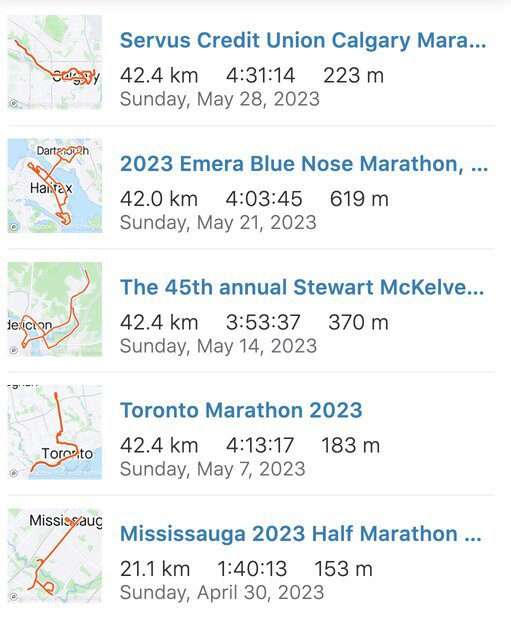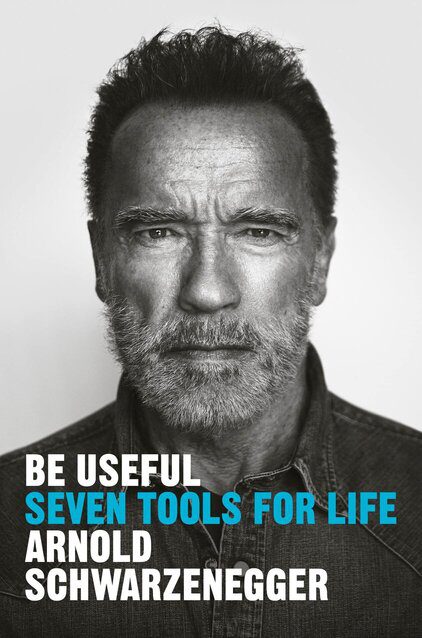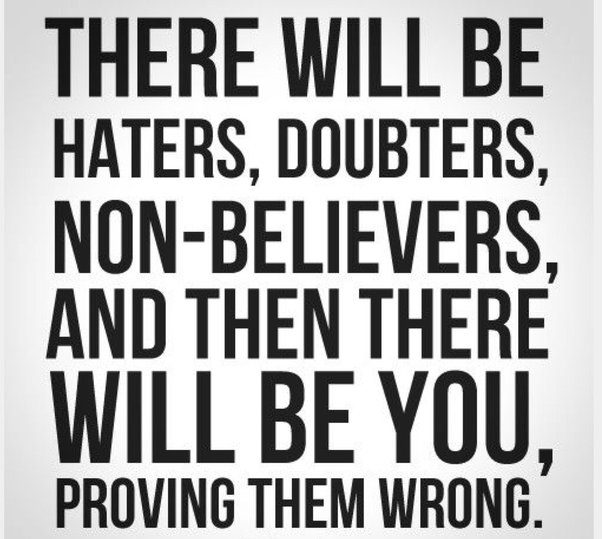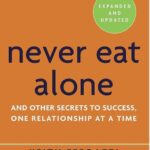‘There will be haters, there will be doubters, there will be non-believers, and then there will be you proving them wrong.’
Naysayers are part of life; they say nay to whatever you are trying to do. Don’t get too bothered about naysayers because that is their nature; there is nothing you can do about them, doubters doubt. How you respond is the one thing you can control about people doubting your dreams and aspirations. Success is the best revenge; shock them with your success and never stay satisfied; stay hungry, and you will be fine. Ignore the naysayers, focus on your goals, find your yaysayers, and become a better version of yourself. When you realize that people doubt you not because of you but it is more about them. Naysayers project their fear and insecurities to feel better about themself and their low-level thinking.
“First they ignore you, then they laugh at you, then they fight you, then you win.” – Mahatma Gandhi

I have run and finished 15 full marathons in the past 2 years, six in 2022 and nine in 2023. Anytime I tell most people my goal of running, for example, this year, 10 marathons in 2023, I get remarks such as “That is crazy,” “It is impossible,” “Is that possible,” etc. In May 2023, I ran four back-to-back full marathons, and the voice of the naysayers got even louder. It was impossible, they said before I did and after I did it, I was asked how did I do it, and their statement began to change to “How do you do it,” “You are built differently,” “It is probably your genes” and on and on. My strategy for dealing with naysayers and their cynical comments is to use their comments as motivation and ignore their doubting. As German philosopher Arthur Schopenhauer once quipped
“All truth passes through three stages. First, it is ridiculed. Second, it is violently opposed. Third, it is accepted as being self-evident.”

In his book, Be Useful: Seven Tools for Life 1, former governor of California and movie star Arnold Schwarzenegger was doubted several during movie career and life as a politician. He reckons that Naysayers are a fact of life and they should be ignored, He advised finding your Yaysayers instead of paying attention to naysayers. He Writes:
There will always be people in your life who doubt you and doubt your dream. They will tell you it’s impossible. That you can’t do it or that it can’t be done. The bigger your dream, the more often this will happen, and the more of these people you will meet.
Naysayers are a fact of life. That doesn’t mean they get to have a say in your life. It’s not that they’re bad people. They’re just not very useful to someone like you. They’re scared of the unfamiliar and the unknown. They’re afraid of taking risks and putting themselves out there. They’ve never had the courage to do what you’re trying to do. They’ve never crafted a huge vision for the life they want and then put a plan together to make it a reality. They’ve never gone all in on anything.
When it comes to you and your dreams, the naysayers have no idea what they’re talking about. And if they haven’t done any of the things that you’re trying to do, the question you need to ask yourself is: Why should I ever listen to them? The answer is, you shouldn’t. You should ignore them. Or better yet, hear what they have to say and then use it as motivation.
Naysayers are a fact of life. That doesn’t mean they get to have a say in your life. It’s not that they’re bad people. They’re just not very useful to someone like you.
You are going to be doubted

Ben Smith was discontent with his life; he had just recently divorced and was dissatisfied with his job, but he found running therapeutic. As Ben announced his intention to run 401 marathons, he was constantly doubted, and the naysayers were everywhere he turned. In his book, 401: The Man Who Ran 401 Marathons in 401 Days and Changed His Life Forever 2, Ben writes about his experience dealing with naysayers and his strategy for dealing with their doubting.
That was the general reaction: ‘You’re doing what? Running 401 marathons? In a row? Are you serious? No chance! I wouldn’t even bother.’ People looked at me as if I’d lost my mind. Some people didn’t think I’d start The 401 Challenge, let alone finish it. I found it a little bit frustrating to start with, but I came to expect it. And then I learned to ignore it. I’d walk away thinking: ‘OK, that’s your opinion, but I’m going to prove you wrong.”
Maybe you do have to be a little bit unhinged to even consider running 401 marathons in a row, but who says I’m the mad one? Maybe it’s the rest of you.
There’s a madness about complaining and whingeing and not doing anything about it, especially when you know you’ve only got one life. And those people who complain and whinge about their own lives are the first to judge anybody trying to live their life differently. That had been me, constantly telling myself I needed to change my circumstances, but I did bugger all about it for so long. I only had myself to blame; I was so hell-bent on achieving everything I’d been told I had to achieve to be successful in life, from when I was a kid, and I was scared of the alternatives, terrified to even consider thinking in a different way.
I’d settled, told myself: ‘No, I’m fine with my lot. If anybody else wants to do something different, I’ll watch from a distance.’ How awful is that? One life, and I’d settled on how it was going to roll out, from my 20s until the day I was old and grey. That’s where I was. And I wasn’t happy. But I stepped back from the situation and thought: ‘I don’t want to live this life anymore. I don’t know what life I want to live, but I know it’s not this one. But if this isn’t happiness, what is? Maybe if I start to think in a different way, I’ll find it. What if I get rid of the money and the possessions? That makes sense, because I can categorically say they’re not making me happy. And once they’re gone, maybe I’ll have a clearer idea of what happiness is.’ I suddenly realised you can do what you want, when you want to do it. If you really want to.
You can do what you want, when you want to do it. If you really want to.
Naysayers are part of life
In her memoir, Becoming 3, former First Lady of the United States of America Michelle Obama writes about the inevitability of coming across naysayers and critics on your path to achieving your goals and aspirations. She observed that Naysayers are going to be everywhere, the key is to tune down their noise, lean towards people who believe in you and match towards your goal.
I’ve been lucky enough now in my life to meet all sorts of extraordinary and accomplished people—world leaders, inventors, musicians, astronauts, athletes, professors, entrepreneurs, artists and writers, pioneering doctors and researchers. Some (though not enough) of them are women. Some (though not enough) are black or of colour. Some were born poor or have lived lives that, to many of us would appear to have been unfairly heaped with adversity, and yet still they seem to operate as if they’ve had every advantage in the world.
“But as I’ve said, failure is a feeling long before it’s an actual result. And for me, it felt like hat’s exactly what she was planting—a suggestion of failure long before I’d even tried to succeed. She was telling me to lower my sights, which was the absolute reverse of every last thing my parents had ever told me.”
What I’ve learned is this: All of them have had doubters. Some continue to have roaring, stadium-sized collections of critics and naysayers who will shout I told you so at every little misstep or mistake. The noise doesn’t go away, but the most successful people I know have figured out how to live with it, to lean on the people who believe in them, and to push onward with their goals.
The noise doesn’t go away, but the most successful people I know have figured out how to live with it, to lean on the people who believe in them, and to push onward with their goals.
Most naysayers are suffering from “possibility blindness”, they do not think it is possible, and it is beyond their veil of consciousness, hence their naysaying and doubting. Your job is not to convince naysayers with your words, get the result you intend to achieve, and they will come around. One of the most challenging aspects of dealing with naysayers it is usually your closest associates who doubt you the most. Your results will eventually cancel the insults. Keep believing in yourself and keep showing up towards achieving your goals. You’ve got this.
Meditation
- Daily Calm with Tamara Levitt – Boredom
- In our day-to-day lives, many of us have the need to have our minds perpetually stimulated. It is like we are waiting through life deep in a river of stimuli and any gap in that river, any absence of stimulus, or even a second brings discomfort. If there is an awkward silence in a conversation, we scramble to fill the void with talk, if the Wi-Fi goes down and our browser goes blank; we panic to go back online.
- It is no wonder boredom comes up as we sit, it is common to want to fight an irresistible urge to do anything rather than just sit there. So we begin to entertain ourselves, and our mind jumps into daydreams of the past or the future. We are unable to just stay with the boredom and be with the boredom.
Hot vs Cool Boredom
Hot boredom is like being locked in a padded cell. You are bored, miserable, and irritated. You will probably experience lots of that in your meditation practice. Behind the boredom, or even within it, you feel something refreshing: cool boredom. With cool boredom, you don’t feel imprisoned. Cool boredom is quite spacious, and it creates further softness and sympathy toward ourselves. The boredom is cooling, refreshing, like the water from a cold mountain stream.—Chögyam Trungpa Rinpoche, Mindfulness in Action
“When you pay attention to boredom it becomes unbelievably interesting” – Jon Kabat-Zinn.
- Daily Jay by Jay Shetty: The Path of Self-Compassion
- Self-esteem is the confidence that you hold in your abilities and attributes. It can rise and fall based on circumstances. Self-worth exists on a more foundational level, it is an acknowledgement of your fundamental values and understanding that you are worthy of love, no matter what. In an ideal world, our self-esteem could occassional take a hit but we never lose our sense of worth.
- Associate Professor of Educational Psychology at the University of Texas at Austin, Dr. Kristin Neff recommends having more self-compassion and explains that if self-worth is the goal, immune to the fluctuations of self-esteem; then self-compassion is the path way to get there. Self-compassion according to Dr. Neff is acknowledging the difficult moment and then asking how you can comfort and care for yourself.
- When we fall or fail, we should be gentle and empathetic towards ourself, we should think about what we will do if our loved one came to us in the same situation. We all have flaws, make mistakes and get hurt. We are all deserving of calm, affection, safety and peace.
“People are like stained-glass windows. They sparkle and shine when the sun is out, but when the darkness sets in, their true beauty is revealed only if there is a light from within.”― Elisabeth Kübler-Ross
The three steps of self-compassion
- Say to yourself, “This is a moment of discomfort or stress,” mindfully acknowledging and accepting whatever is present.
- Acknowledge that discomfort or stress, any form of suffering, is a part of life. It is a part of our common humanity, and you are not alone.
- May I be kind to myself in this moment
Podcast
- I Couldn’t Stop Crying… The Most Emotional Interview I’ve Ever Done with GRANGER SMITH
All the best in your quest to get better. Don’t Settle: Live with passion.



Comments are closed.